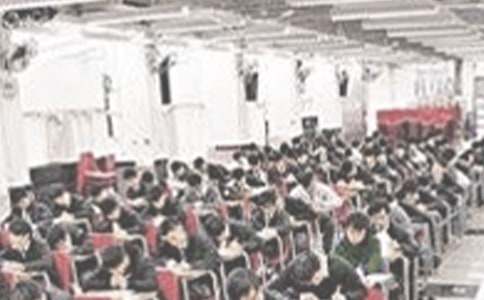- 相關(guān)推薦
大學(xué)英語(yǔ)專八考試改錯(cuò)試題模擬練習(xí)
Jack of all trades and master of none.以下是小編為大家搜索整理的大學(xué)英語(yǔ)專八考試改錯(cuò)試題模擬練習(xí),希望能給大家?guī)?lái)幫助!更多精彩內(nèi)容請(qǐng)及時(shí)關(guān)注我們應(yīng)屆畢業(yè)生考試網(wǎng)!

Aimlessness has hardly been typical of the postwar Japan whoseproductivity and social harmony are the envy of the United Statesand Europe.But increasingly the Japanese is seeing a decline __1__of their traditional work-moral values. Ten years ago young people were hardworking and saw their jobs as their primary reason for being,but now Japan has large __2__fulfilled its economic needs, and young people don't know where they should go next.
The coming of the age of the postwar baby boom and an entry of women into __3__the male-dominated job market has limited the opportunities of teen-agers who __4__are already questioning the heavy personalsacrifices involved climbing __5__Japan's rigid social ladder to good schools and jobs. In a recent survey,it was found that only 24.5percent Japanese students were fully satisfied with__6__ school life,compared with 67.2 percent of students in the United States.
In addition, far more Japanese workers expressed dissatisfaction with their jobs thandid their counterparts in the 10 countries surveyed. While often__7__ praised by foreigners for its emphasis on the basics.
Japanese education tends to stress test taking and mechanic learning __8__over creativity and self-expression. Last year Japan experienced 2,125incidentsof school violence, including 929 assaults on teachers.
Amid the outcry, many conservative leaders are seeking a return to the prewaremphasis on moral education. Last year Mitsuo Detoyama,who was then educationminister, raised his eyebrow when he argued that liberal reforms introduced__9__ by the American occupation authorities after World War II had weakenedthe "Japanese morality of respect of parents." __10__
答案:
1.is--are.the加上形容詞一類人的時(shí)候后面應(yīng)用動(dòng)詞的'復(fù)數(shù)形式,如:The old receive particular respect in Chinese society.
2.large-largely.這里large是修飾fullfilled的,所以應(yīng)改為largely,表示“大部分地”,如:The fundis largely financed through government borrowing.
3.the(age)--/.動(dòng)詞詞組come of age表示“已成年”,中間不用任何冠詞,所以它一旦變?yōu)?ing形式仍然保持原樣。另外要避免將原句誤讀成The coming of ,the age of the postwar baby boom,這樣斷句意思解釋不通。考試.大4.has--have.有兩個(gè)原因限制了青少年進(jìn)好的學(xué)校找到好的工作,這兩個(gè)原因由and連接作并列主語(yǔ),所以謂語(yǔ)動(dòng)詞應(yīng)該用復(fù)數(shù)。
5.involved^--in.involved后面少了in,表示“關(guān)于,涉及到”,如All the children were involved in the school play.
6.^Japanese--of.當(dāng)percent做名詞時(shí),它后面應(yīng)加上介詞of,如:The report states that 42 percent of the alunmi contributed to the endowment. 當(dāng)percent作形容詞或者副詞時(shí),則不加of。如:There has been a ten percent increase in the number of new students arriving at polytechnic this year.
7.^countries--other.從上句話中可知道Japan也參與了這次普查,因此在這句話里的比較結(jié)構(gòu)中Japan應(yīng)和其他10個(gè)同意參加普查的國(guó)家進(jìn)行比較,所以應(yīng)注明是10 other countries。考試.大8.mechanic--mechanical.mechanic是名詞,表示“制造工,技工”,所以這里應(yīng)把它改為mechanical表示“機(jī)械的”。
9.eyebrow--eyebrows.to raise one's eyebrow 表示“(某事)引起(某人)的驚訝或不贊同”,如:He raised his eyebrows over some of the suggestions.
10.of--for.respect 后面通常跟for接人,表示“對(duì)(某人)的尊重”,如:respect for the old
【大學(xué)英語(yǔ)專八考試改錯(cuò)試題模擬練習(xí)】相關(guān)文章:
英語(yǔ)專八備考習(xí)題改錯(cuò)模擬練習(xí)08-03
2017年專八英語(yǔ)改錯(cuò)練習(xí)試題07-03
2017年英語(yǔ)專八改錯(cuò)練習(xí)試題09-17
歷年專八英語(yǔ)試題改錯(cuò)練習(xí)及答案09-26
專業(yè)英語(yǔ)八級(jí)考試改錯(cuò)練習(xí)模擬試題10-26
2022英語(yǔ)專八考試改錯(cuò)練習(xí)題08-28
最新英語(yǔ)專八考試改錯(cuò)高級(jí)試題輔導(dǎo)06-05